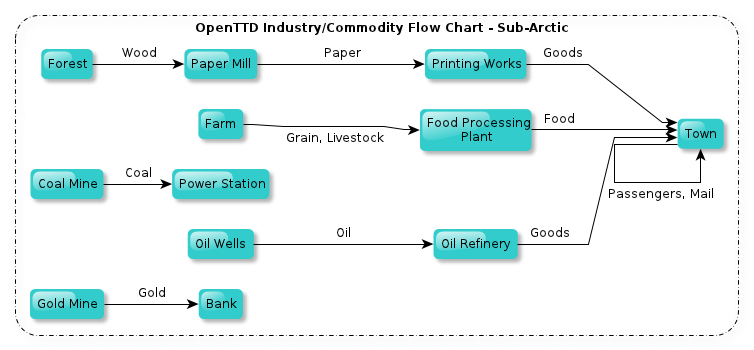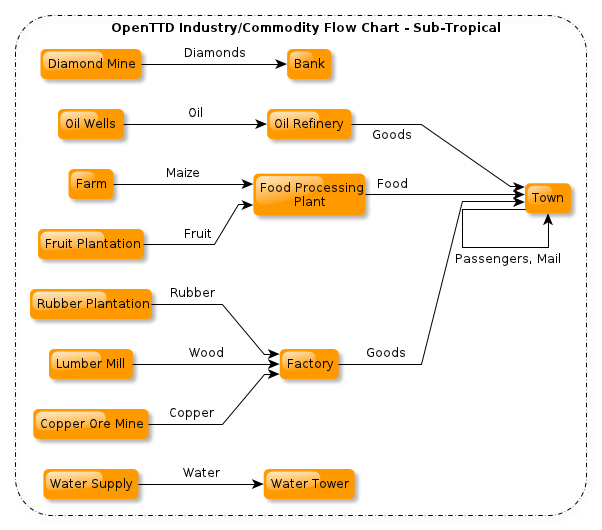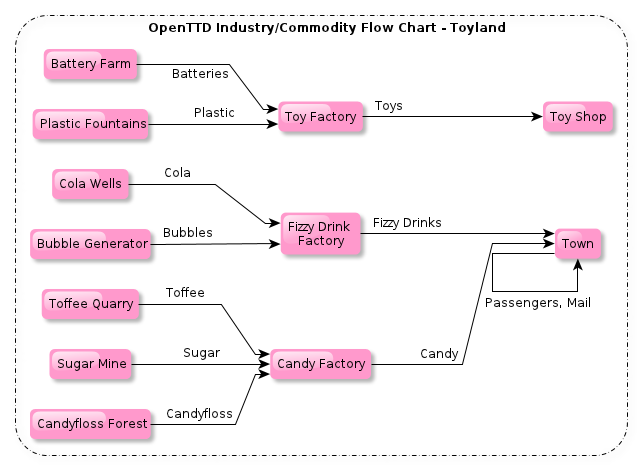In Manual, Cargo is what you, as a Transport company, transport (relocate) between cargo agents. Some cargo agents (Industries or town buildings) produce cargo, and some agents accept (consume) cargo; some both produce and accept cargo. All cargo exists in the form of discrete, atomic units of a fixed quantity and size. E.g. a single unit of Oil consists of exactly 1000 litres. Every action — whether production, transfer or consumption — is conducted against an integer number of cargo units.
Cargo can only be accessed by an agent via a nearby Stations. Accepting agents that are nearby a station accept (consume) cargo and passengers from this station, while producing agents will deliver their produced cargo to any nearby station, allowing it to be transferred elsewhere. (In some industries, only certain squares can accept cargo. See Catchment area for more information.)
An accepting agent consumes cargo units (effectively destroying them) upon unloading at a nearby station, and pays for their transportation. A producing agent creates new cargo units and places (delivers) them to nearby stations, if available and if a vehicle accepting that type of cargo has been to the station before.
In some cases, the agent produces and accepts the same type of cargo — unloading that type permanently destroys all old units (standard payment occurs), unless the vehicle is ordered to transfer.
Once cargo unit is delivered to a station, the station's owner company effectively controls it. From this moment, the company alone decides where or how to transfer or store it. The company can't sell the cargo, however it can collect payment for transferring it to a station with an accepting agent nearby which accepts the same type of cargo.
Each cargo unit tracks its own age, starting from the moment it was produced; some cargo types deteriorate faster than others and must be served faster. The transfer costs always include a penalty for the age. Cargo dissipates/vanishes over time at stations if left there for too long. Companies are not charged for those losses, although waiting too long to pick up cargo does affect the rating of the station.
A production agent does not distribute cargo evenly among nearby stations. Instead, it checks certain conditions before delivering the cargo to a station. This is a crucial (and somewhat obscure) part of competitive play. It involves logistics, service throughput effectiveness and local reputation (rating). Refer to delivery and Game Mechanics.
Passengers and Mail are also types of cargo, mainly produced and accepted by Towns. Different building squares in towns accept differing amounts of passengers and other cargo. The acceptances can be found out by using the land area information tool (question mark). If a square can't accept a cargo by itself, the amount is noted by 1/8's. There has to be at least 8/8 of a cargo type in a station's catchment area for the station to accept that cargo.
Some industry tiles also accept 1/8 of passengers. Industries however, except for Oil Rigs, don't produce any passengers. Most notably, Steel Mills have many 1/8 squares and can accept passengers on their own. Furthermore, the Company Headquarters accepts and generates some passengers and mail to help players in the very beginning of the game.
See Cargo income for more information on how income is calculated.
Below are charts and tables showing each Cargo in each climate, and what produces and accepts them.
Cargo Types Flow Charts
Good Production and Acceptance Tables
| ||||||||||||||













